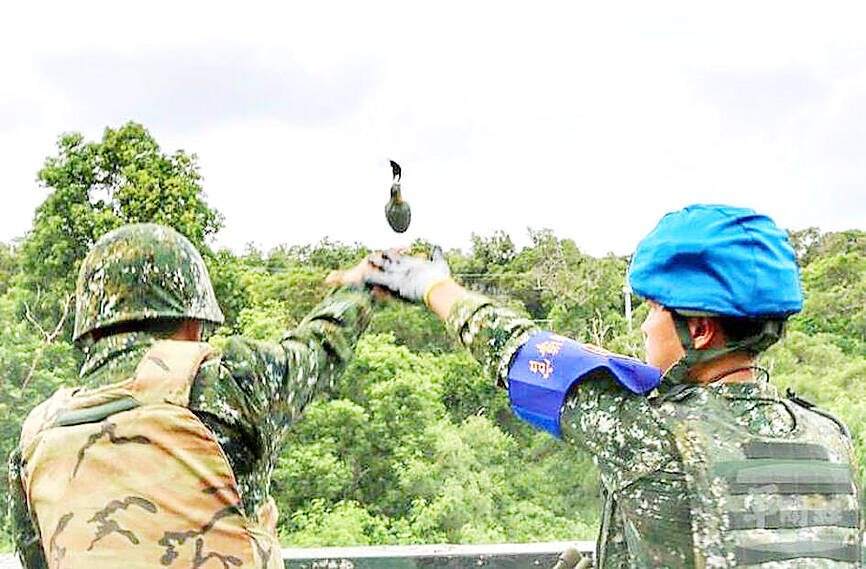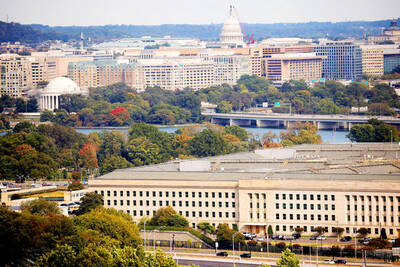The Ministry of National Defense has signed a NT$135 million (US$4.1 million) deal for M67 fragmentation hand grenades with the American Institute in Taiwan, a government procurement notice showed.
According to the notice posted yesterday on the government’s procurement Web site, the deal inked by the Defense Mission to the US on July 19 was a single-source contract being implemented from last month to December 2028.
Kaohsiung’s Neimen District (內門) is listed as the place of the contract’s implementation.

Photo courtesy of the Military News Agency
The ministry has requested that the legislature to authorize a NT$103 million deal for obtaining US-made grenades, it said in this year’s budget proposal.
Local media previously reported that the sum is equivalent to the buying price for 730,000 hand grenades.
The M67 is a design originating in the Vietnam War that features a more powerful explosive filler, a more reliable fuse and a smooth metal casing that produces deadlier fragments than previous designs.
In other news, a military source on Thursday said that precision live-fire missile drills are set to be conducted in southern Taiwan later this month and feature the domestically developed Chien Hsiang loitering munition.
The annual drills are to be held in areas around Jiupeng Base in Pingtung’s Manzhou Township (滿州) from Aug. 20 to 22, said the source, who spoke on condition of anonymity.
The military is to conduct live-fire exercises with indigenous Hsiung Feng-II and Hsiung Feng-III anti-ship missiles, the Tien-Kung III land-based surface-to-air missile, as well as the US-made Patriot PAC-2 surface-to-air system, the source said.
The exercises would also involve the Chien Hsiang loitering munition developed by the Chungshan Institute of Science and Technology, the source said, adding that the institute has already delivered two variants of the Chien Hsiang.
A loitering munition, also known as a suicide drone, is a kind of aerial weapon with a built-in warhead that is typically designed to loiter around a target area until a target is located, then attack by crashing into it.
During the three-day exercises, coast guard patrol vessels are expected to be equipped with anti- ship missiles to train alongside the navy’s warships, the source said.
According to a notice released by the Maritime and Port Bureau, the areas that are to be affected would include Taitung and Pingtung counties, as well as Green Island (綠島), Orchid Island (Lanyu, 蘭嶼) and the Hengchun Peninsula.

FIREPOWER: On top of the torpedoes, the military would procure Kestrel II anti-tank weapons systems to replace aging license-produced M72 LAW launchers Taiwan is to receive US-made Mark 48 torpedoes and training simulators over the next three years, following delays that hampered the navy’s operational readiness, the Ministry of National Defense’s latest budget proposal showed. The navy next year would acquire four training simulator systems for the torpedoes and take receipt of 14 torpedoes in 2027 and 10 torpedoes in 2028, the ministry said in its budget for the next fiscal year. The torpedoes would almost certainly be utilized in the navy’s two upgraded Chien Lung-class submarines and the indigenously developed Hai Kun, should the attack sub successfully reach operational status. US President Donald Trump

Taiwan Semiconductor Manufacturing Co (TSMC, 台積電) is expected to start construction of its 1.4-nanometer chip manufacturing facilities at the Central Taiwan Science Park (CTSP, 中部科學園區) as early as October, the Chinese-language Liberty Times (the Taipei Times’ sister newspaper) reported yesterday, citing the park administration. TSMC acquired land for the second phase of the park’s expansion in Taichung in June. Large cement, construction and facility engineering companies in central Taiwan have reportedly been receiving bids for TSMC-related projects, the report said. Supply-chain firms estimated that the business opportunities for engineering, equipment and materials supply, and back-end packaging and testing could reach as high as

ALL QUIET: The Philippine foreign secretary told senators she would not respond to questions about whether Lin Chia-lung was in the country The Ministry of Foreign Affairs on Wednesday confirmed that a business delegation is visiting the Philippines, but declined to say whether Minister of Foreign Affairs Lin Chia-lung (林佳龍) is part of the group, as Philippine lawmakers raised questions over Lin’s reported visit. The group is being led by Deputy Minister of Agriculture Huang Chao-chin (黃昭欽), Chinese International Economic Cooperation Association (CIECA) chairman Joseph Lyu (呂桔誠) and US-Taiwan Business Council (USTBC) vice president Lotta Danielsson, the ministry said in a statement. However, sources speaking on condition of anonymity said that Lin is leading the delegation of 70 people. Filinvest New Clark City Innovation Park

DEFENSIVE EDGE: The liaison officer would work with Taiwan on drones and military applications for other civilian-developed technologies, a source said A Pentagon unit tasked with facilitating the US military’s adoption of new technology is soon to deploy officials to dozens of friendly nations, including Taiwan, the Financial Times reported yesterday. The US Department of Defense’s Defense Innovation Unit (DIU) is to send a representative to collaborate with Taiwan on drones and military applications from the semiconductor industry by the end of the year, the British daily reported, citing three sources familiar with the matter. “Drones will certainly be a focus, but they will also be looking at connecting to the broader civilian and dual-use ecosystem, including the tech sector,” one source was